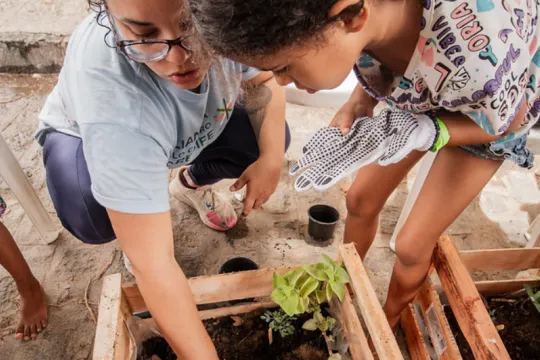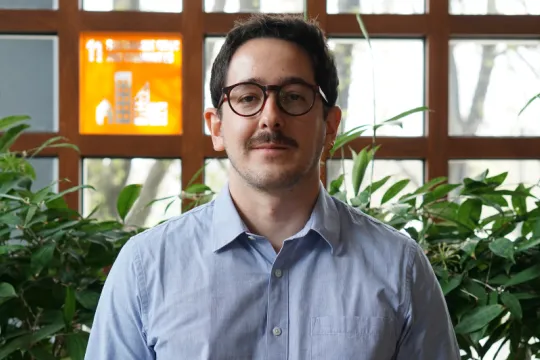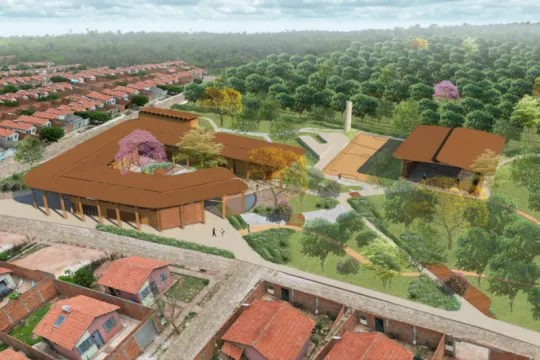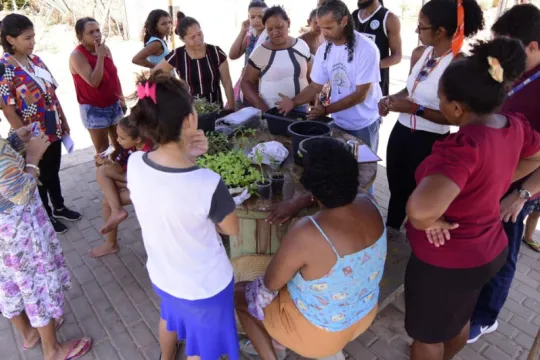Teresina, a city with 871,000 inhabitants, established its Urban Lab at Residencial Edgar Gayoso, a housing complex with high socioeconomic vulnerability. More than 450 families are forced to travel long distances to the city centre and lack access to qualified amenities, services and urban spaces closer to home.
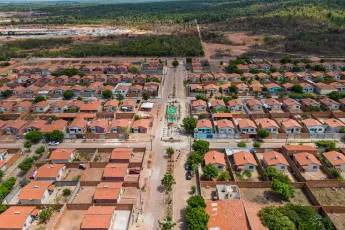
Aerial view of inclusive urban development in Teresina, Brazil, 15 October 2022. © Paulo Sérgio / WRI Brasil
Teresina, Brazil
Teresina is the capital of Piauí state in the north-east of Brazil. This extremely hot and dry city is part of the Brazilian semi-arid region, an area threatened by desertification.
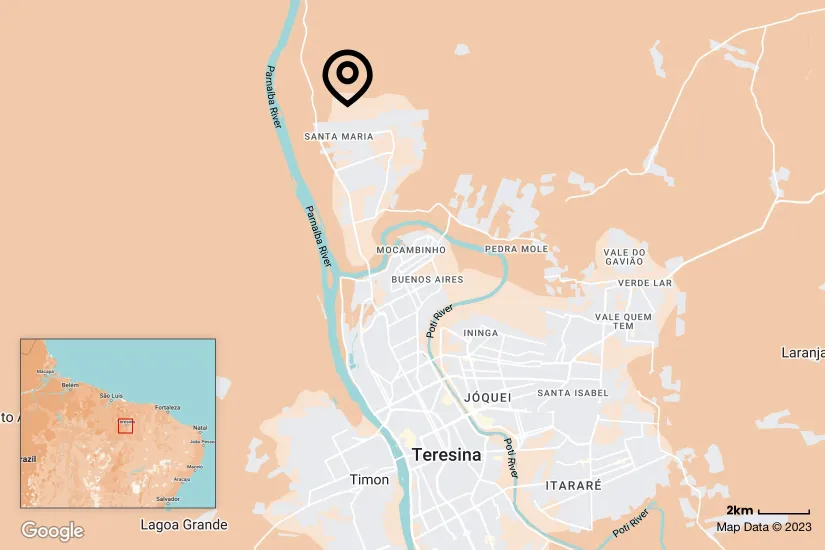
The Latin American Development Bank Vulnerability Index considers Teresina as facing a very high risk of exposure to climate change and extreme events. Additionally, the Brazilian Northeast is known for experiencing issues regarding food security.
As with many other cities in Brazil, Teresina faces challenges in providing affordable and adequate housing. To address the issue, the city adopted the national government's Minha Casa, Minha Vida social housing programme. This programme contains a policy to subsidize the purchase of houses by low-income families. However, the policy design does not have safeguards regarding the location of new houses built under the initiative. This has resulted in the construction of several housing complexes in cheaper locations far from the city centre. Teresina’s high vulnerability to climate change particularly affects Black, Indigenous and People of Colour groups living in these low-income neighbourhoods.
Context & Background
In Teresina, the Urban Lab is situated in the Residencial Edgar Gayoso, a housing complex far from the city centre and with a lack of access to basic amenities and public spaces.
There are over 450 practically isolated residences at Residencial Edgar Gayoso. If at all, inhabitants barely have access to public facilities and services, green and leisure spaces, employment and income generating opportunities, or reliable public transportation. The population has high socioeconomic vulnerability, and residents contribute little or nothing to climate change but suffer disproportionately from its effects.
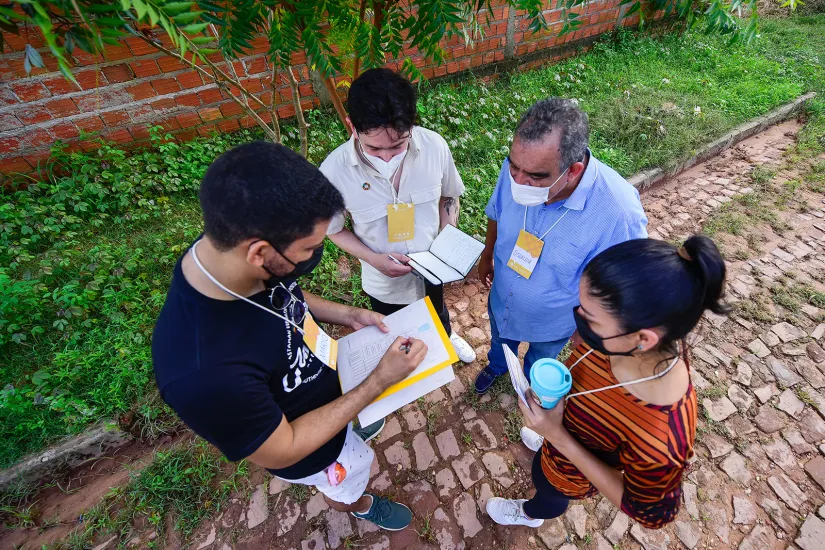
Participatory Mapping Workshop participants in Edgard Gayoso, Teresina, on 20 March 2022. © Paulo Sergio / WRI Brasil
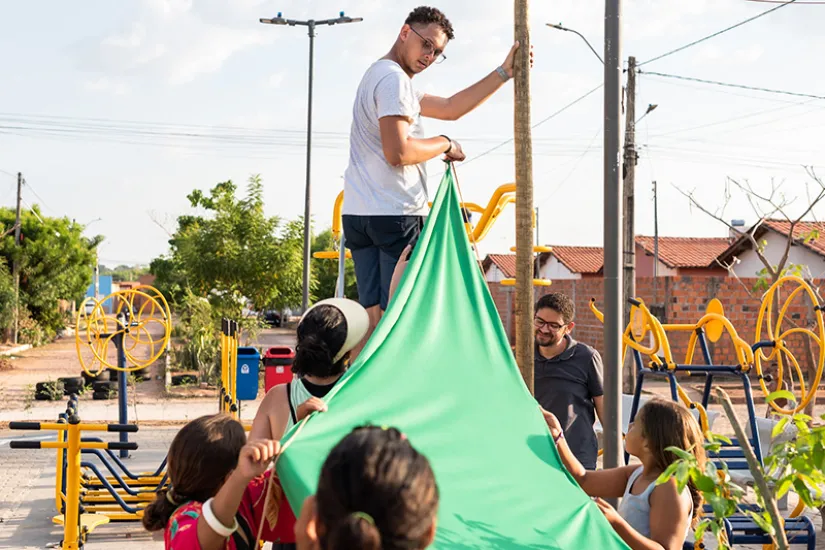
Improving the neighbourhood by building multipurpose community spaces, 15 April 2022. © Paulo Sérgio / WRI Brasil
The Urban Lab
During the first year of the project, many stakeholders engaged in forming a local coalition with strong community participation. The group also includes stakeholders from the municipal government, a community association and professors and students of architecture at the local federal university.
After having studied the problems the community faces and canvassed their needs and wishes, the coalition works together to create solutions that address current and future challenges.
The demonstrative project and strategic interventions in the Edgar Gayoso neighbourhood will positively impact the livelihood and resilience of residents. Through initiatives that focus on sustainability and the creation of multipurpose community spaces and gardens, employment opportunities and income will be generated. In turn, this serves as a solution to tackle the food insecurity issue as well. Additionally, afforestation of native species will reduce heat effects that are currently being exacerbated by a lack of green areas. A final aim is to reduce emissions by lessening travel needs through creating opportunities for leisure and employment in the neighbourhood itself.
Who takes part in the Coalition
- Agenda 2030, Municipal Secretariat of Planning (SEMPLAN/PMT)
- Edgar Gayoso Residents Association (AMREG)
- Center for Efficiency in Urban Sustainability (CESU/Teresina)
- City Research
- Department of Civil Construction and Architecture (DCCA/UFPI)
- Institute of Architects of Brazil - Piauí (IAB-PI)
- Center for Studies of Architecture Design (NUARQ/UFPI)
- Order of Attorneys of Brazil - Piauí (OAB-PI)
- Municipal Secretariat of Citizenship, Social Assistance and Integrated Policies (SEMCASPI/PMT)
- Municipal Secretariat of Urban Development and Housing (SEMDUH/PMT)
- Municipal Secretariat of Environment (SEMAM/PMT)
- Superintendency for Decentralized Administrative Actions North (SAAD North/PMT)
- Superintendence of Partnerships and Concessions of the State of Piauí (SUPARC/PI)
- Residents of the Edgar Gayoso Neighborhood
- Civil Society
Contact: alianca.edgargayoso@gmail.com
Instagram: @alianca.edgargayoso
